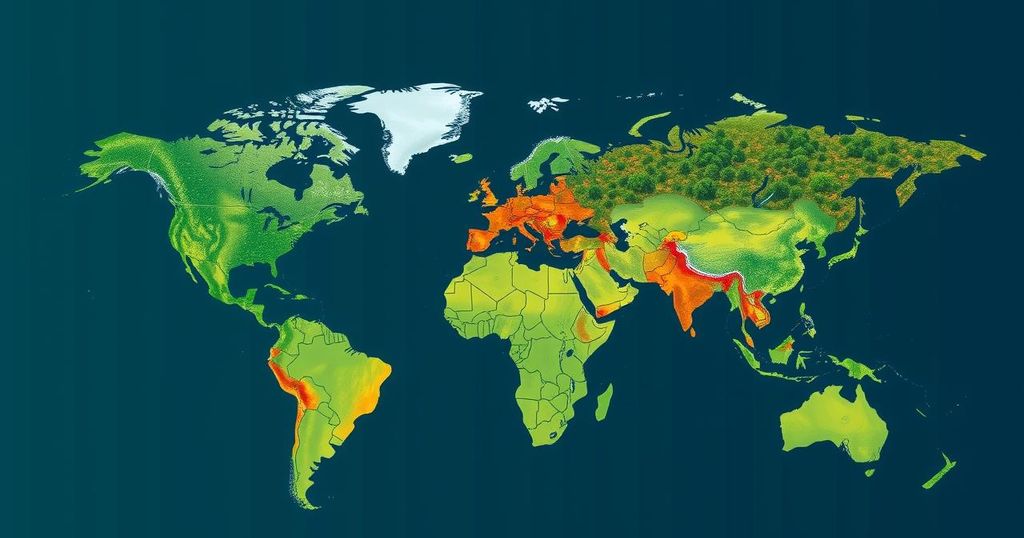In response to climate-related disasters, wealthier nations are beginning to compensate poorer countries for damages. Cyclone Freddy devastated southern Malawi, displacing thousands. The Scottish government’s $750 payment to affected farmer Christopher Bingala exemplifies the “loss and damage” compensation initiative. Although $720 million has been pledged globally, experts warn this may not suffice as climate disasters intensify, highlighting the urgent need for more comprehensive funding solutions.
Recent events highlight the emerging practice of wealthier nations compensating poorer countries for damages suffered due to climate change. In southern Malawi, Cyclone Freddy inundated the region, causing widespread destruction and displacing over 650,000 individuals, including local farmer Christopher Bingala. After losing his home and livestock, Bingala received approximately $750 in compensation, enabling him to rebuild his family’s dwelling. This payment exemplifies the concept of “loss and damage” funding, aimed at supporting low-income countries that face the brunt of escalating climate-related disasters, despite their minimal contributions to global emissions.
The international community has taken steps toward establishing a fund to address these issues, with promises exceeding $720 million from nations such as the European Union and United States. Nevertheless, climate experts caution that this amount will likely prove insufficient given the increasing severity of natural disasters. During the ongoing COP29 climate summit in Baku, negotiations continue regarding the allocation of financial resources for developing nations, reflecting a growing recognition of the responsibilities of wealthy countries.
The devastation wrought by Cyclone Freddy serves as a stark reminder of the need for systemic change. As many low-income households lack safety nets to mitigate the impact of disasters, financial assistance can offer a critical lifeline. Bingala’s ability to relocate and build a safer home demonstrates the potential efficacy of this funding initiative, yet severe challenges persist, including the need to secure education for children and regain livestock.
The direct financial support provided by the Scottish government marks a significant milestone in the framework for loss and damage compensation. Organizations like GiveDirectly have facilitated the disbursement of funds to affected families, allowing them to prioritize rebuilding efforts and invest in their futures. The principle remains that nations with the least engagement in causing climate change should not disproportionately bear its consequences.
As climatic disasters become increasingly frequent and severe, the urgency of comprehensive funding solutions escalates. The anticipated need for loss and damage financing may reach $250 billion annually by 2030, highlighting the critical nature of these discussions at global summits. As Prime Minister Philip Davis of the Bahamas articulates, there is a compelling moral and pragmatic imperative for wealthier nations to acknowledge their roles and responsibilities in mitigating these crises, not just for the sake of vulnerable nations, but for global stability and security.
The phenomenon of compensatory funding for climate-induced damages is gaining traction as developing nations grapple with the impacts of global warming—despite their relatively low contributions to greenhouse gas emissions. The creation of a financial framework to support these countries has been propelled by the recognition of the disproportionate effects of climate change on low-income populations. Notably, Cyclone Freddy in 2023 exemplifies the worsening reality for nations like Malawi, where climate disasters displace tens of thousands and threaten local livelihoods.
In summary, the allocation of compensatory funds for climate change-related damages symbolizes a critical step toward addressing historical inequities faced by low-income countries. As the global community continues to confront escalating climate disasters, the establishment of a robust loss and damage funding system will be vital in fostering resilience and supporting the recovery efforts of those most affected. Ensuring that wealthier nations fulfill their obligations is essential not only for justice but also for the collective welfare of humanity in the face of an ongoing climate crisis.
Original Source: www.wuwm.com






